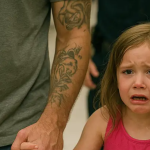My name is Thomas Reid, and I never imagined grief could become something alive—something that breathes, shapes your days, and lives in the silence where laughter used to echo. It all started one Tuesday in March. It was a morning like any other in our small Portland apartment above the bookshop I run. My wife, Anna, was getting ready for work.
She coordinated patient-care programs at a medical facility, helping families through difficult, emotional medical situations. That morning, she was especially excited about a new pediatric cancer program she was launching—something she believed would make a profound difference. I kissed her goodbye, thinking she had purpose and hope in her eyes.
Hours later, everything changed.
Wife’s Disappearance
Around 2:30 PM, I received a call from Dr. Jennifer Walsh, Anna’s supervisor. Anna hadn’t returned from lunch. She had meetings she never missed, but no one had seen her since noon. My first thought was relief—maybe she got called into one last meeting, maybe something delayed her—but deep down, I felt dread.
For hours, I searched for her. I called, visited places she might have been, asked neighbors, stayed in the bookshop, understanding that something was very wrong. As darkness fell, police joined the search. I drove around in circles, tried to piece together clues, hoping she’d walk in through the door.
The Devastating Truth
That evening, a detective called me to the station. What they revealed shook me to my core. Anna’s body had been found earlier in Forest Park. The medical examiner said it looked like suicide—she had taken a lethal combination of prescription medications.
I couldn’t believe it. Anna was full of hope, enthusiastic about her work, and excited about expanding her new program. Could someone so vibrant really vanish like that?
Hallucinations of Hope
In the days that followed, the memories faded into something else. I began to hear her voice at home, see her moving through our apartment, smell her coffee, and feel her presence. I’d set two plates on the table, leave her side of the bed untouched, carry on imagined conversations with her work—her visions so clear I momentarily believed she was still with me.
Doctors later told me these were hallucinations brought on by complicated grief—my mind producing details from everything I knew about Anna to protect itself from a loss too large to accept.
A Hidden Truth Uncovered
Six months after she was gone, while sorting through her office, I found a hidden folder. Inside were documents, emails, and proof that Anna had discovered financial corruption at the medical facility—fake invoices, diverted charitable funds, and patient support services being undermined. She was gathering evidence against people trusted with vulnerable families and planned to bring it to light.
The morning after that discovery, I could no longer believe in the suicide finding. With these documents, I contacted the authorities. Investigations revealed what Anna had feared: the person who had first raised alarm over her disappearance, Dr. Jennifer Walsh, had allegedly orchestrated a plan to silence Anna, making her death look like self-harm to end the investigation.
Walsh was later arrested and convicted for fraud, embezzlement, and her role in Anna’s death. The funds meant to help families battling pediatric cancer were restored. The program Anna had built was rescued and carried out, with her values honored.
Moving Forward
In the months since, I have learned that knowing the truth, while painful, can finally free someone from living in a lie. The hallucinations stopped. Anna’s coffee mug still sits in the sink. Her books still lie open. I don’t touch them. They are memorials, not illusions.
I founded a memorial fund in her name to help families navigate cancer care, to support transparency in medical facilities, and to hold people accountable. Anna believed in making a difference; now I carry her torch so her voice still matters.
Anna is gone—but in her legacy, I find purpose.

